In pictures: Women making technology work for them
- Published
To mark International Women's Day, photographers at Panos Pictures have teamed up with the Internet Society as part of the Shine the Light campaign to document women from 11 countries who are using technology to make things happen for their communities, families and themselves.
Here the women offer an insight into how they use technology to shape their lives.

Anne Kjaer Riechert - Germany
Founder of ReDi School of Digital Integration, Berlin Peace Innovation Lab and Kids Have a Dream
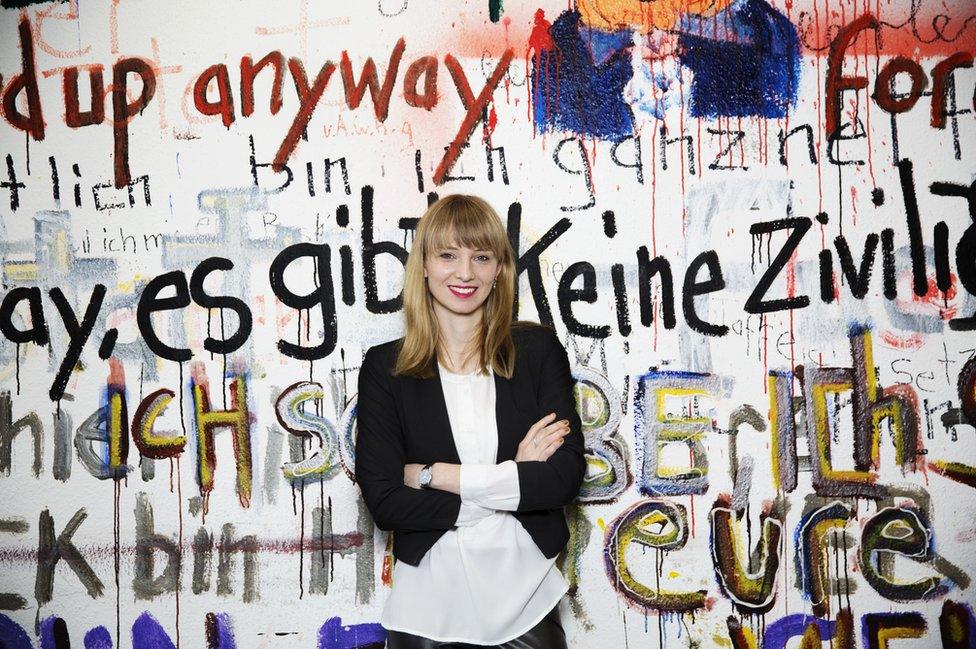
"I studied peace studies for two years, looking specifically at innovation and technology, so how you can leverage the power of technology in order to create better collaboration between people, and ultimately come up with solutions that can be implemented to create a better society.
"I think peace is such a fluffy term to many people. And my question during my studies was, how do you make peace tangible?
"So if you could quantify peace by using technology, I thought that would be really interesting, and very helpful to come up, essentially, with the argument and the right data, that peace is more profitable than war.
"If we could show, in a very, very concrete financial way in financial terms, how peace is profitable, I hope that would lead to a much better society."

Iffat Gill - Netherlands
Human rights activist and social entrepreneur who founded ChunriChoupaal in Amsterdam, and the award-winning Community Technology Center for Women project in rural Pakistan
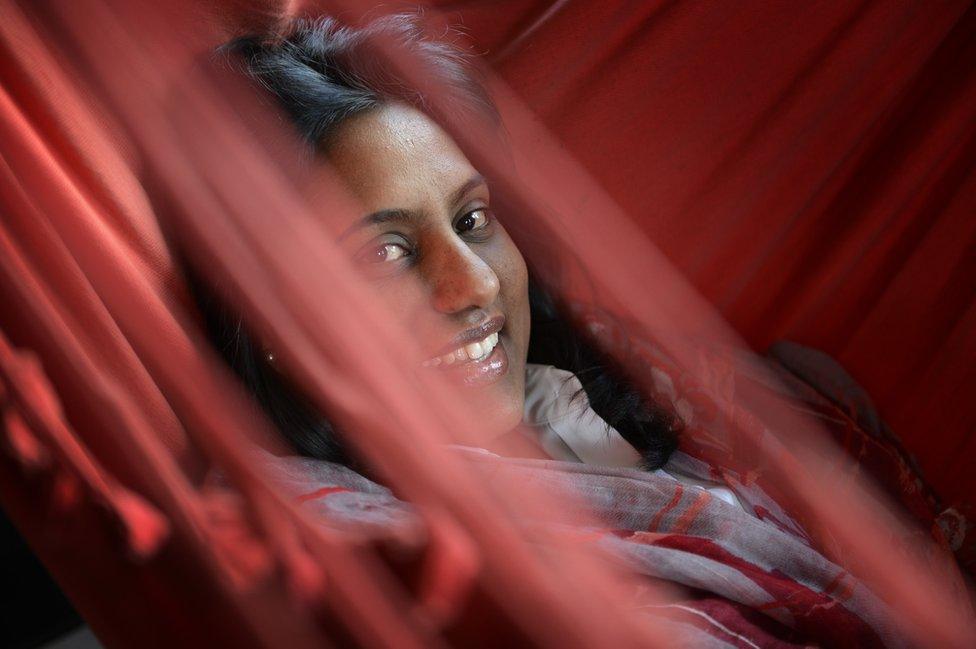
"I escaped a forced marriage in Pakistan, and one of the biggest reasons was because I was economically empowered. That's what I'm advocating for.
"It's very important for women, especially those who come from disadvantaged backgrounds, that they are economically empowered. And I think technology provides tremendous opportunities to be able to do that for women.
"It's just impossible to stay away from technology, because it's become such an integral part of our life now, and the fact that we are lagging behind and there are less women who are comfortable with technology, or less women in the technology field and into coding, that's really taking a toll on the whole of humanity."

What is International Women's Day?
International Women's Day, external has been held on 8 March every year since 1913, and has been recognised by the United Nations since 1975.
The UN says it's a time to reflect on progress made, to call for change and to celebrate acts of courage and determination by ordinary women who have played an extraordinary role in the history of their countries and communities.
The theme of this year's day is "Planet 50-50 by 2030" - aiming to achieve global equality in areas such as education and end all forms of discrimination.
Read more on International Women's Day

Linda Kobusinge - Uganda
After training with AfChix (a network of African Women in Computer Science), she has experimented with digital design practices in Uganda and would like to move into app development
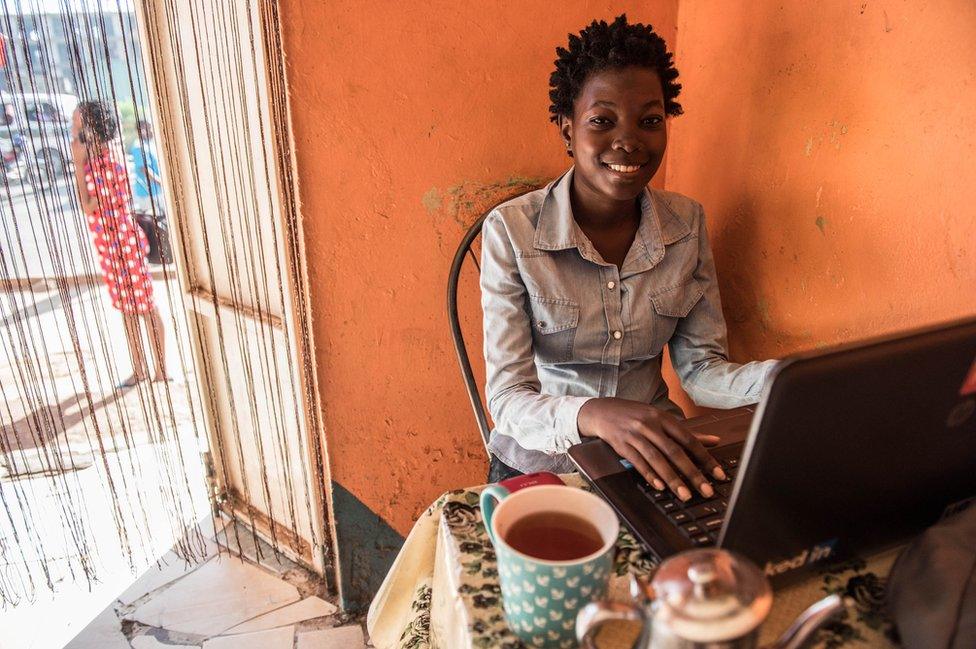
"I wasn't interested in web stuff, or computer stuff. But then my school was invited for the girls in ICT Day, and those ladies of Afchix Uganda told us about their professions, how they were web developers and engineers. They said someone can do a mobile app that can change the world and that maybe, one day, I'll wake up and do the same thing.
"The reason I chose graphic design is that when I was young we used to watch cartoons like Power Rangers. And I was like, one day, I want to make my own animation. That's what I told my siblings. That's why I want to do graphic design, to make my dream come true."

Linda Liukas - Finland
A Finnish computer programmer, children's writer and programming instructor

"Computing, as an industry, is such a young field, that we're still building this body of work to explain and communicate it to the rest of the world. I think the very thing that I want to show is how coding can be as creative a tool as music or drawing or words.
"You create something out of nothing, with pure words and thought structures. Learning programming teaches you to look at the world in a different way.
"Our kids are going to live in a world where everything around them is a computer. One skill to navigate that world is definitely coding, but it's also about developing the imagination, attitudes and approach towards technology."

Mariel Garcia M - Mexico
A change consultant in ICT in Mexico, working with groups such as Unicef on youth projects
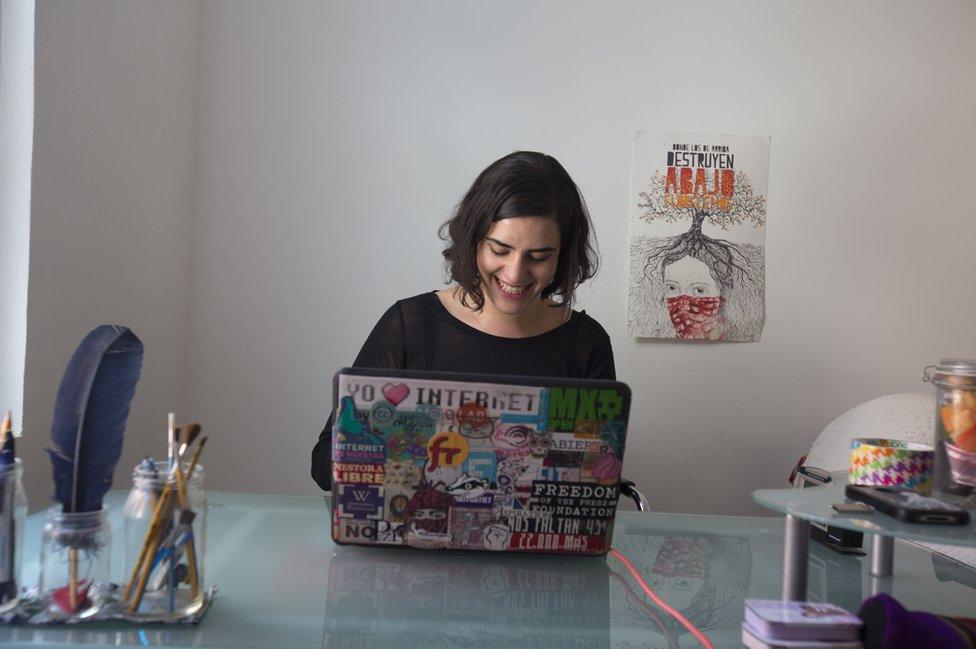
"I was 10 years old when the computer arrived at my home, and basically that day, I started using the internet for hours at a time. This was in the 1990s, when parents didn't really care if you were spending too much time online, because they didn't understand what it was.
"And so I had, unmonitored, unrestricted access to the internet, maybe just filtered by how dial-up connections were at the time. And I just saw how my life truly changed because of that, because of the content I was exposed to, the friendships I made, how I learned about things that I would have never learned about otherwise.
"My aim is to give people working with youth the tools to use technology as a pretext to have more important conversations. So for example, sexual and reproductive rights organisations that teach people how to use condoms.
"Let's have a workshop where kids find out how a Wiki article is produced, and why the Wiki article on Aids might be totally difficult to understand for them, and understand how it came to be.
"Or how to assess results when you Google if you're pregnant or not, and how to take things with a grain of salt. Like you always tell people that they should be critical of information, so I want to give adults who work with youth special and concrete ways to give youth the tools to do that."

Dr Freida Abtan - UK
A multi-disciplinary Canadian artist and composer living in London
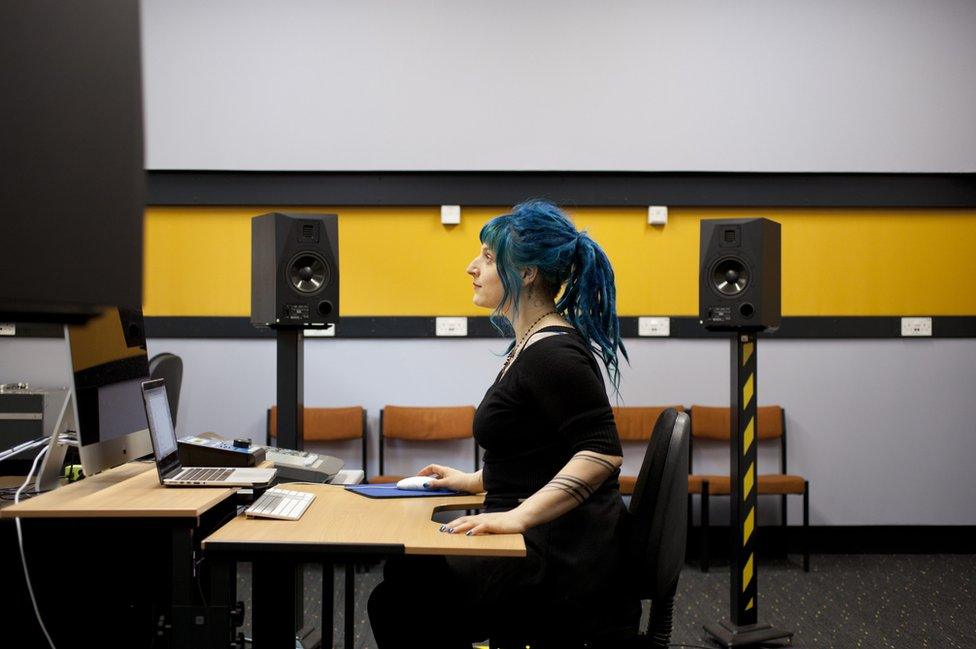
"I went to school for pure math and computer science, but even then, I was always really an artist.
"When I started studying math and computer science, I immediately started thinking about ways I could apply it to sound. Programming is like a secret power for me, that I can whip out and apply to my art in all sorts of ways."

Alissa Cooper - US
An engineer in the Collaboration Technology Group at Cisco Systems
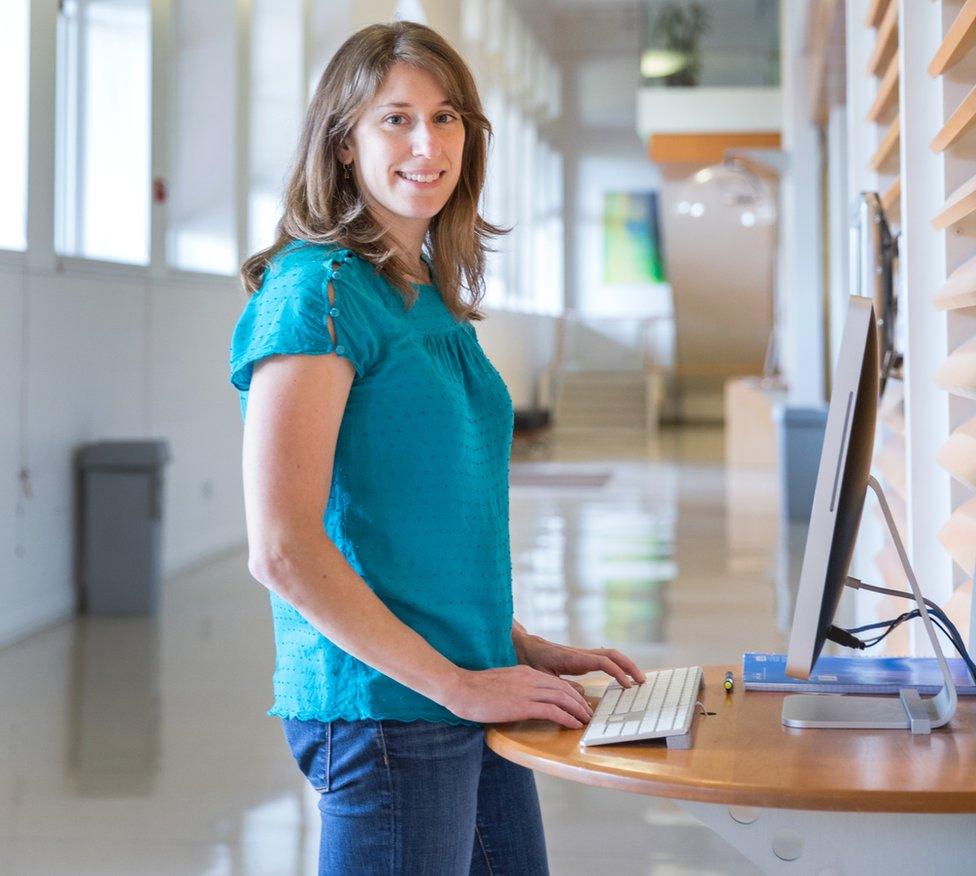
"My main advice would be to blaze your own trail.
"Don't assume that the only options available to you are kind of the ones that get pitched in the career fair brochure.
"That the main thing is to focus on what you like to do, what you're interested in, what makes you tick, and think about how your skill set can come together with those interests.
"And the technology industry is so dynamic that there are so many opportunities for anyone to blaze their own trail, that people should always think that's a possibility for them."

Dr Kanchana Kanchanasut - Thailand
Responsible for the introduction of the internet to Thailand
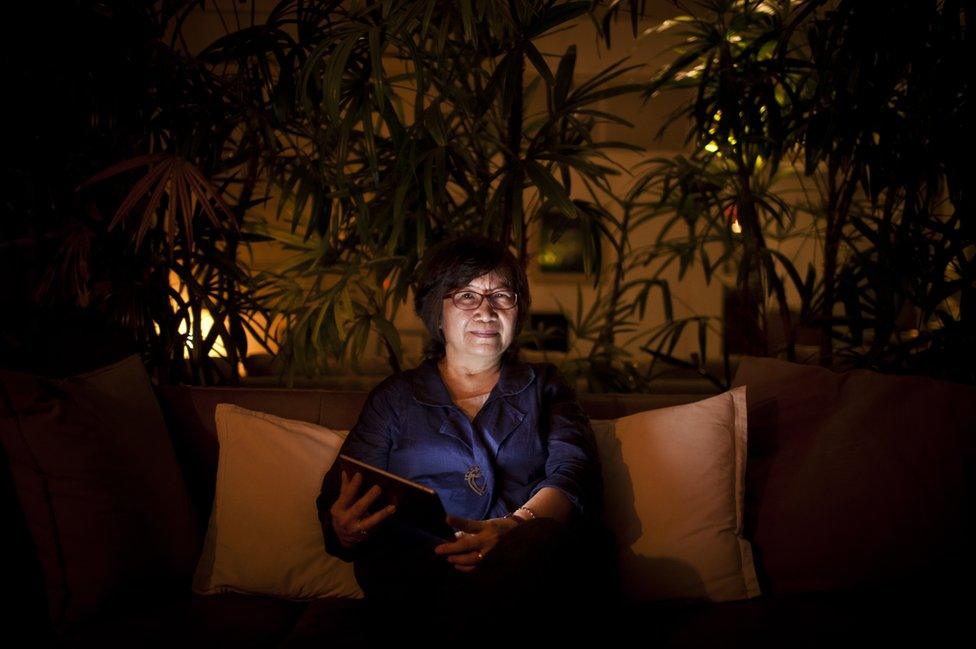
"I had to leave my home town and had to move to the capital city, and then eventually move to another country for my education. So the moment I could see that my students could share resources with people in other countries, I was very happy, and I thought, 'This is means a lot for education.'
"My students will not have to travel that far, and can do whatever they'd like to do. At that moment I thought, 'The world's going to change.'"

Dorcas Muthoni - Kenya
A computer scientist, chief executive and founder of Openworld Ltd and founder of the regional organistion AfChix, a mentorship and capacity building initiative for women in computing across Africa

"When I was doing my first job I realised I was the only woman in the organisation at this time. So at one point, I kind of wished myself to find a girl that we could intern, just to make sure that I could see more girls in the workplace.
"And as I was thinking, 'Where are these girls, and why are they not joining this career?', I realised that it's about lack of information when making their career choices.
"So I just thought that maybe we could start to do some workshops to get awareness to the high school girls, that if you study computer science that is still a good point, and that will probably build you up well.
"I always tell girls, 'Even if you get into design, get into medicine, get into whatever it is, you're going to need some well-detailed computer skills. Whatever you want to be, you want to be a doctor, you want to be a lawyer, you'll need technology.'"

Poornima Meegammana - Sri Lanka
Animator and film-maker and founder of Respect Girls on the net, which campaigns to protect women and girls from harassment online

"My mom is an ICT teacher and my dad is an IT professional, so I was in touch with technology from the day I was born. I got to know about the world before my peers and how women were making change and it empowered me to go pursue my dreams.
"I want to be a film director to talk about social issues, through film. That's my dream now.
"Next week, I have a shoot about bullying. The Internet Governance Forum is happening in Sri Lanka, so we thought we'd do a short film at the same time. So it is about how a group of kids bully a girl through WhatsApp. It happens a lot here."

Nighat Dad - Pakistan
Founded Digital Rights Foundation and in 2015 was named in Time magazine's list of next-generation leaders, for helping Pakistani women fight online harassment
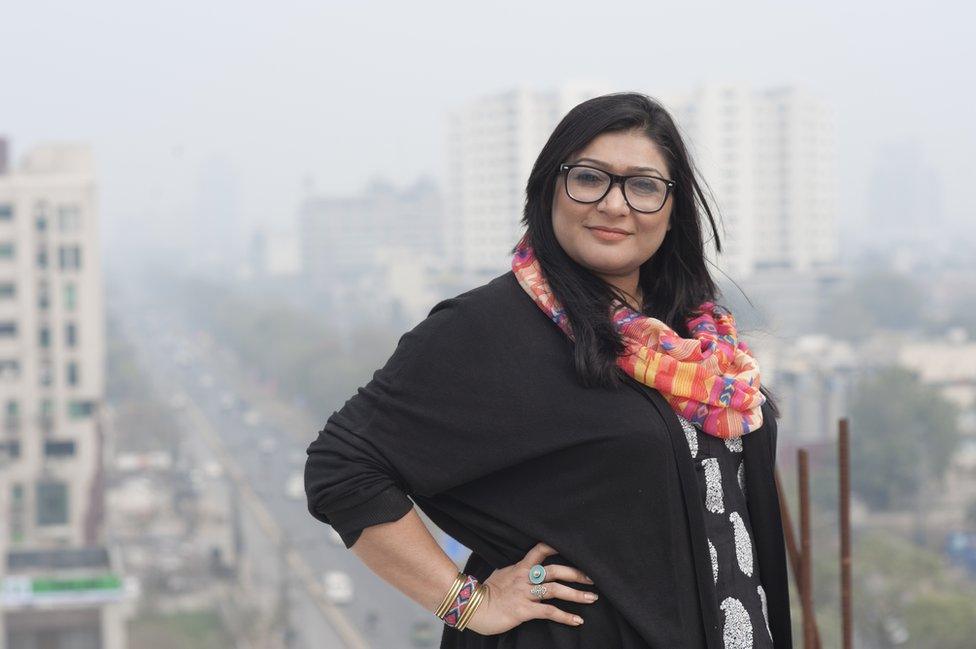
"Persevere. Stay at it. It's a field that has so many opportunities, but also so many frustrations that will come about because you're 'just' a girl.
"It's a field that has had women be involved in it from the get-go - Ada Lovelace, Grace Hopper, to name just a couple."

The Shine The Light campaign aims to highlight the work of women using technology via the hashtag #ShineTheLight.
All photographs © Internet Society / Panos Pictures.